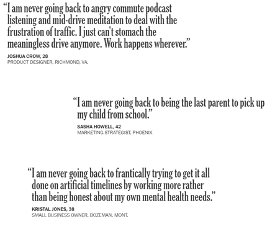Back in the 1980s and 90s, I was an ambitious, driven woman. By then, the women’s movement had evolved the mainstream, and I was excited to become part of it.
I grew up in an all-female household, except for my dad. I saw him going out to work every day, and as a result, having significant power and influence in the family decision-making. I wanted to have that kind of influence.
So, in my late 20s, I found my way into institutional money management on Wall Street, for a hedge fund in Connecticut, and then in London. I didn’t choose this field because I wanted to make a lot of money – but rather because I saw it as an industry that would enable me to have financial security and influence. I saw that it offered the things my dad had.
I loved the work on many levels – I was consistently intellectually challenged. I was traveling to Europe on a regular basis, meeting people from around the world, and attending meetings with clients who had their fingers on the pulse of the global economy.
But the schedule was grueling and the culture of institutional money management was demanding. It was all about “just make more money” – for yourself and for the financial institution you worked for.
In the late 1980s while living in New York and working on Wall Street, my body gave me a wakeup call. I came down with mononucleosis.
Over the next 10+ years, I never recovered.
Over the next decade, my parents trotted me around the country to find out why I couldn’t get well. I went to multiple diagnostic clinics – some in our own backyard (Virginia Commonwealth University Health and University of Virginia Health) and others that were considered best in the world, including the Mayo Clinic.
The result? According to numerous experts, I was “completely fine.”
But the problem was, I wasn’t fine. I was extremely ill – spiking fevers, aching joints, extreme fatigue, constant headaches. These symptoms were exacerbated by stress, leaving me sometimes hardly able to function.
Fortunately, during this 10+-year period I discovered yoga and meditation – and was introduced to an amazing doctor of Traditional Chinese Medicine. All of these helped, but it wasn’t until I stumbled upon Phyllis Balch’s book Prescriptions for Nutritional Healing that all became clear. Thanks to that book, I figured out that I had an underlying thyroid disorder – and it had been missed by every single diagnostic clinic and multiple other doctors along the way.
The diagnosis, confirmed by an endocrinologist, resulted in my return to Richmond from London to focus on my health. I left institutional money management, became a yoga instructor, and eventually shifted to management consulting.
During this period, I redefined aspects of what mattered most to me and what I valued in my life and my work.
The most impactful learnings from my journey were things everyone needs to know as they navigate their wellness journey:
- You need to be your own advocate. Whether it’s about your health, your work or other life choices, you need to do the hard work. If I had taken the initial doctors’ advice at face value, I would still be walking around with chronic mononucleosis.
- You need to identify your core values. I truly believe that at least half of my health issues were driven by the stress of living outside of my values. While I loved the intellectual side of the work, institutional money management has one central tenet – make more money – and that has never been one of my core values.
I am now back in finance – but this time, on my own terms. As a Certified B Corp, my workplace puts an emphasis on work-life balance. The message is less about “getting your hours in” and more about our values:
- We strive to support our community and the planet in the way we run our business.
- We are squarely focused on serving our clients to the very best of our ability.
- We trust our team to make fair and equitable choices about balancing their work and family commitments.
How we do this is a bit more unstructured: Our work may require some early morning hours or evening hours – and occasionally some hours on the weekend. Some weeks may be 35 hours, with subsequent weeks 45 hours. But it’s flexible – while also staying true to our regulatory requirements of having “office hours.”

Thanks to a global pandemic, the conventional approach to work is shifting – and we see people asking the question, “What do I truly value?”
Women are often worse than men about using their voices to express what they need and value. Many women have a desire to please (including me!), but, in doing so, they sacrifice important aspects of themselves. We just held our inaugural program on Women, Money & Mindfulness, launched specifically to support women in defining what they value and making intentional choices about their careers and lives, while being informed about (but not held hostage by) their money.
We encourage our readers – particularly women, to first and foremost identify and understand their personal values. Have a conversation with your employer if you are struggling to fit into their paradigm. Your employer needs to trust that you can get the work done well while also supporting your family and living a meaningful life. If they don’t, then you have the choice to make a change – and to reimagine how work can fit into a good life.
Need help figuring out what you value most? And how money fits into the conversation? Reach out. We want you to live your most authentic life.
Source:www.nytimes.com/interactive/2021/09/23/opinion/covid-return-t

